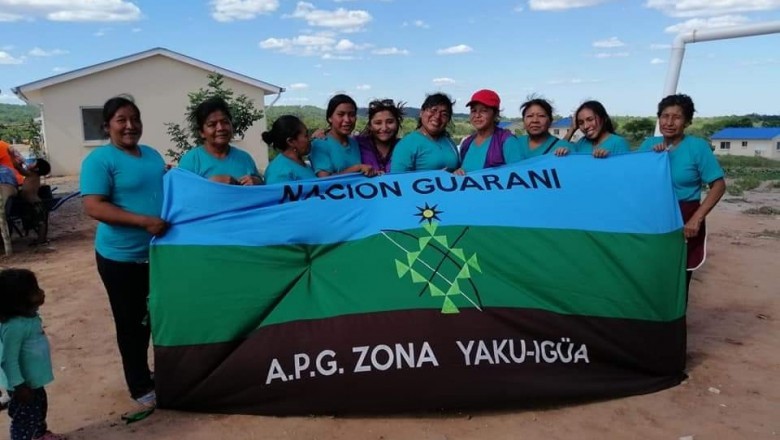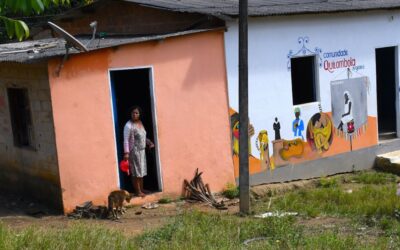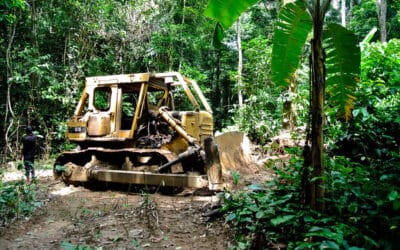Published in Ms. Magazine on 1/11/2023 by Juana Vera Delgado
This article was written by Senior Gender Expert Juana Vera Delgado of the Global Forest Coalition and appeared in Ms. Magazine on January 11, 2023. It tells the story of an important land rights victory for Indigenous women in Bolivia, which we spoke to these women about at a conference on Indigenous People’s Day.
Landmark Global Biodiversity Agreement Enshrines Rights of Indigenous Peoples—Providing Hope for Bolivia’s Guarani
After more than four years of negotiations, on Dec.19, 2022, nearly 200 nations adopted the Kunming-Montreal Global Biodiversity Framework—a binding agreement to protect at least 30 percent of the world’s biodiversity within 2030. The agreement represents a significant step forward towards rights-based, gender just and socially equitable biodiversity conservation.
The agreed text not only recognizes Indigenous territories as an important, autonomous contribution to area-based conservation, but it also includes other targets—like calling on governments to recognize the rights of Indigenous peoples, local communities and women in biodiversity conservation.
The framework admittedly isn’t perfect. It does not wholly incorporate Indigenous peoples’ demand for their lands and territories to be fully recognized as a category of conserved area. But it’s still decisive for the recognition and respect of collective, environmental, cultural and gender rights of Indigenous peoples—women, in particular.
Every day and for hundreds of years, Indigenous men and women, environmental and human rights defenders are confronted with threats—from intimidation, physical attacks, rapes and murders, to prohibitions on free expression and association and forced displacement from their territories.
Yet, there is hope that the Kunming-Montreal Global Biodiversity Framework will help to reign in these violations and return stolen lands to communities and ensure the rights of Indigenous peoples across the world.
One such community that continues to struggle against generations of injustice is the Guaraní of Laguna Chica, Bolivia, located in the Yaku Agüa territory by Bolivia’s southern border with Argentina. There, recent legal victories have given the Guaraní people hope that more than 500 years of colonization, enslavement and environmental destruction of their lands can be overturned, as recounted in their recently published book: Laguna Chica: The First Ancestral Territory Longed and Consolidated by the Organized Force of the Guaraní Women of Yaku Igüa-Tarija, written by one of their women leaders.
“Now we live freely, without bosses,” said Mrubicha Modesta Medina, a Guaraní traditional leader.
In July 2019, after years of struggle, Guaraní women of regained access to areas of their ancestral land robbed from them and converted into industrial farmlands and cattle ranches.
Medina’s words weigh heavy with meaning in light of her community’s historical struggle against colonization and patriarchy, which has kept the Guaraní Indigenous People enslaved and dispossessed of their lands since the Spanish invasion in the late 16th century. Women’s gender and cultural and environmental justice movements have been at the forefront of the community’s struggle, epitomizing the collective capacity of Indigenous Peoples in their unwavering fight for redistributive justice. Their story, as told in the book, teaches us that it is possible not only to dream but also to bring about real, transformative change.
Medina’s words weigh heavy with meaning in light of her community’s historical struggle against colonization and patriarchy, which has kept the Guaraní Indigenous People enslaved and dispossessed of their lands since the Spanish invasion in the late 16th century. Women’s gender and cultural and environmental justice movements have been at the forefront of the community’s struggle, epitomizing the collective capacity of Indigenous Peoples in their unwavering fight for redistributive justice. Their story, as told in the book, teaches us that it is possible not only to dream but also to bring about real, transformative change.
Under the weight of a history of dehumanization and oppression, the women of Laguna Chica armed themselves with courage and bravery to fight back and reclaim their community land (Tierras Comunitarias de Origen, or TCO) from the “landowners” and cattle ranchers. These “terratenientes” displaced them from their territories, appropriated their lands and planted monoculture crops of soybean and corn, destroying the forest and biodiversity ecosystems.
Recovering their community land took a physical, economic and psychological toll on the women, but it also empowered them and filled them with pride to see the fruit of their struggles: the recovery of their territory, their culture and, most importantly, their dignity, which had been continually trampled on by the patriarchy and its colonial extractivist system.
Their victory builds on earlier gains, thanks to the determined struggle of the Guaraní, organized under the Assembly of the Guaraní People (APG), established in 1987. The central mission of the APG, part of the CIDOB ‘Central de Pueblos y Comunidades Indígenas del Oriente y de la Amazonía de Bolivia,’ has been the “reconstitution of the Guaraní nation,” including the organizational, territorial, educational, linguistic, cultural, economic and human rights destroyed by the colonial trinity system: dispossession, religious acculturation and civic (military) education.
After independence, the Bolivian state continued institutionalizing this trinity system via laws that protected the terratenientes and sought to eradicate the Guaraní. To this day, Jan. 28 is marked as the anniversary of the Kuruyuki massacre of 1892, in which 5,000 Guaraní were massacred by the Bolivian Republican Army. Those Guaraní who survived the massacre fled to northern Argentina, where they were captured by the terratenientes and enslaved.
Prior to that, neither the Inca nor the Spanish empire had been able to defeat the Guaraní people. According to a royal provision collected in 1882 by missionaries from the Franciscan College of Tarija, the only formal declaration of war against an Indigenous people was made by the Spanish monarch Felipe II against the Guaraní. Yet despite this, the Guaraní remain resolute in their efforts to gain back their rights, dignity and lands.
On Aug. 15, 1990, thousands of Guaraní women, men and children set off from the Cathedral of the Holy Trinity in Beni on a 600-kilometer, 34-day march across the tropics, Andean valleys and cold highlands to the Bolivian capital La Paz to demand the return of the territories of the Guaraní nation. The Chiriguanos-Guaraní also joined from the eastern part of the Chaco.
Their list of demands for the government of President Jaime Paz Zamora was clear: that the entire Chimán forest be granted to the Guaraní people as Indigenous territory; that the logging companies be evicted from the forest; and together with other local claims, the government of Bolivia respect and recognize their traditional authorities or mrubichas.
According to Guaraní norms, both women and men can hold the position of mrubicha. Presently a woman, Eva Cadencia, is the most senior authority in the APG.
On the heels of the long march, after 498 years of oppression, the government recognized and signed (at least on paper) four decrees assigning Indigenous territories the status of national parks. In 1996, Bolivia passed the Agrarian Reform Service Law No. 1715/96 (INRA Law), which was modified in 2006 by the Agrarian Reform Community Renewal Law No. 3545/06 (RCRA). According to the law and Article 394 of the Bolivian Constitution, Territorios Indígenas Originarios Campesinos (TIOCs) enjoy the legal guarantees of indivisibility, non-seizability, imprescriptibility, inalienability, and are collective.
Despite this legal recognition, the Guaraní people have been made to fight legal battle after legal battle to recover and consolidate just a small part of the claimed territories. The original land claim made by the APG amounted to 10,380,945 ha—19 territories across an area almost similar to the actual Chaco region—according to the titles held by the National Agrarian Reform Council. But only 1,016,997 ha (15 percent) have been titled. Ironically, 69 percent (701,727.93 ha) of these titled lands are still in the hands of private landowners who consolidated their titling within the TIOCs territories.
In the case of Yaku Igüa (the territory of Modesta), the land claims amounted to 305,758 ha, but the state only recognized 644 ha—a mere 0.21 percent of the claim.
Families cannot access the allotted areas yet, due to clashes of interests between different actors—namely the Indigenous legal title holders and illegal landholders, cattle ranchers, peasants and businessmen. This has caused constant conflicts, which have led to armed confrontations—as in the case of the Pananti massacre of 2001, in which seven people were killed and over 100 injured. Following the massacre, several male Guaraní leaders were persecuted and jailed.
Yet the Laguna Chica women were not discouraged. In 2019, they resolved to take back possession of their lands. Like so many generations before them, forced from their lands, their families were struggling to survive amidst intolerable, inhuman living conditions in urban slums of cities such as Yacuiba and Tarija. The Laguna Chica, under the leadership of then-mrubicha Miriam Narvaez, took the firm decision to set off to their traditional home and take back their lands.
“We came with the purpose of taking possession of our territory. That day we did not think about our family or our children and we came without them, even though we have difficulties with our partners,” said Narvaez,
For the first months, the women sheltered in rustic tents to protect themselves from the intense sun, wind and rain that lashed them mercilessly, since the land had been deforested and deprived of its water sources. Despite the adversities and dangers, and with the support of their families, civil society and the sisterhood of other Guaraní communities, the women maintained their resolve to recover their lands.
The terratenientes denied the charge of the destruction of the forest ecosystems and biodiversity, amounting to a crime of ecocide, and instead sued the Guaraní for three million Bolivianos ($435,000 USD) in agro-environmental court for “improvements.”
“We were surprised when we heard that payment for improvements demanded by the gentlemen, who, instead, have done tremendous damage to nature,” one of the male leaders said. “We, as Indigenous people, as poor people, were shocked by the amount; three million!! … We were all speechless.”
Throughout the two-year court case, the terratenientes continued to use the disputed lands. Modesta recalled, “When we were here for a year, those who thought they were the landowners, the terratenientes, were still cultivating it; and we, who are the [rightful] owners did not even plant, we were just watching it, they put their big tractors, their harvesters and trucks. … But we, armed with courage, stood in front of the tractors to prevent them from continuing to sow [the fields].”
In July 2019, the last definitive eviction took place—partly due to support of other Guaraní communities, such as Caiza, Campo Grande, Laguna Seca and El Palmar. After fighting three legal processes over five years, the women of Yaku Igüa managed to recover a part of their territories (230 ha). They are still fighting to recover their territories in their entirety. These women are determined to convert the fields desolated by the landowners into territories of life.
Laguna Chica, published in June 2022, is an instructive telling of the territorial struggles of these women, who also set out to document their achievements and dreams on their own terms. It describes not only the deep aspiration of Indigenous women for cultural, environmental and gender justice but also reflects the aspirations of Indigenous peoples for redistributive justice. As Modesta Medina said on the 2022 Day of Indigenous Peoples, “Sisters and brothers from other places, do not lose heart in your struggles to reclaim your land. Keep moving forward… You will achieve it, as we have done.”
The women of Laguna Chica have inspired other groups of Guaraní women to recover their lands, as is the case of ‘Grampa’ land. Against the backdrop of centuries of oppression and struggle, the Guaraní women of Laguna Chica have shone a light on a future where the Guaraní can reclaim their nation and with it, their role as custodians of Mother Earth, including their forests, water sources, soils and all its respective biodiversity.
Link to source: Ms. Magazine




